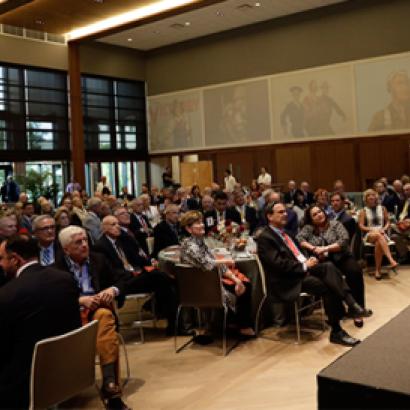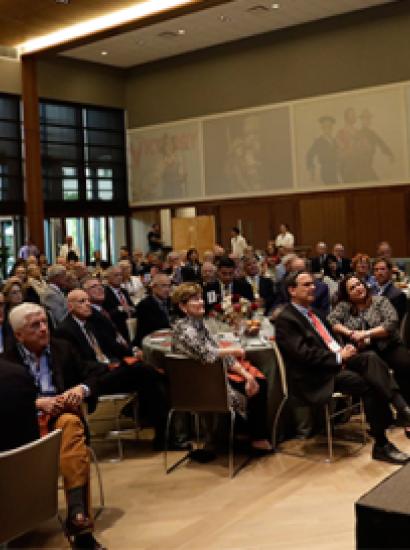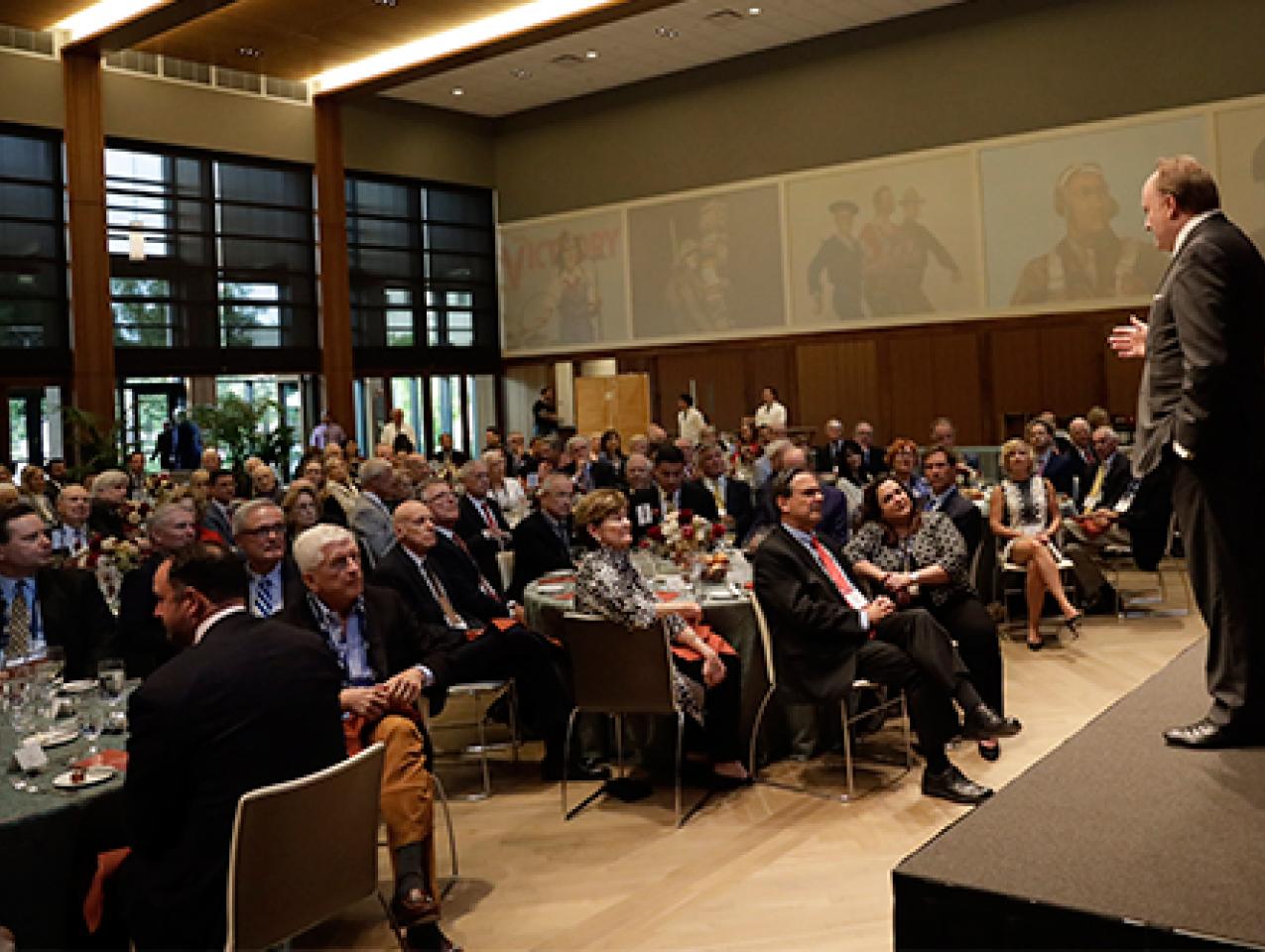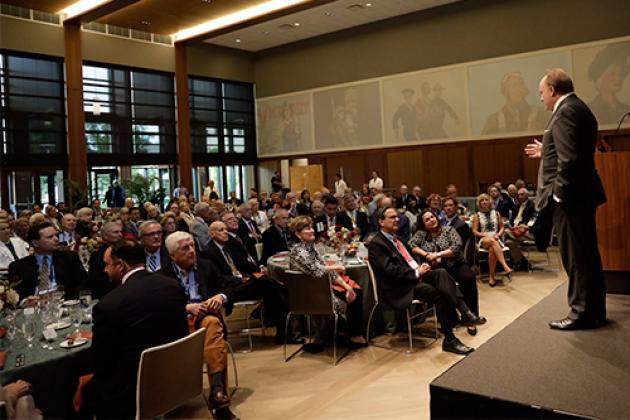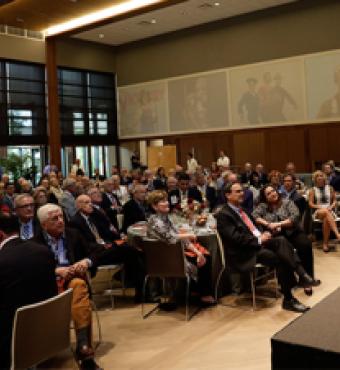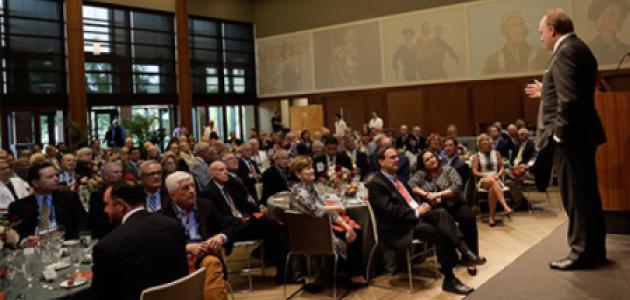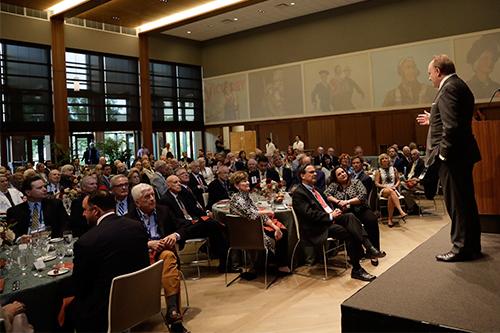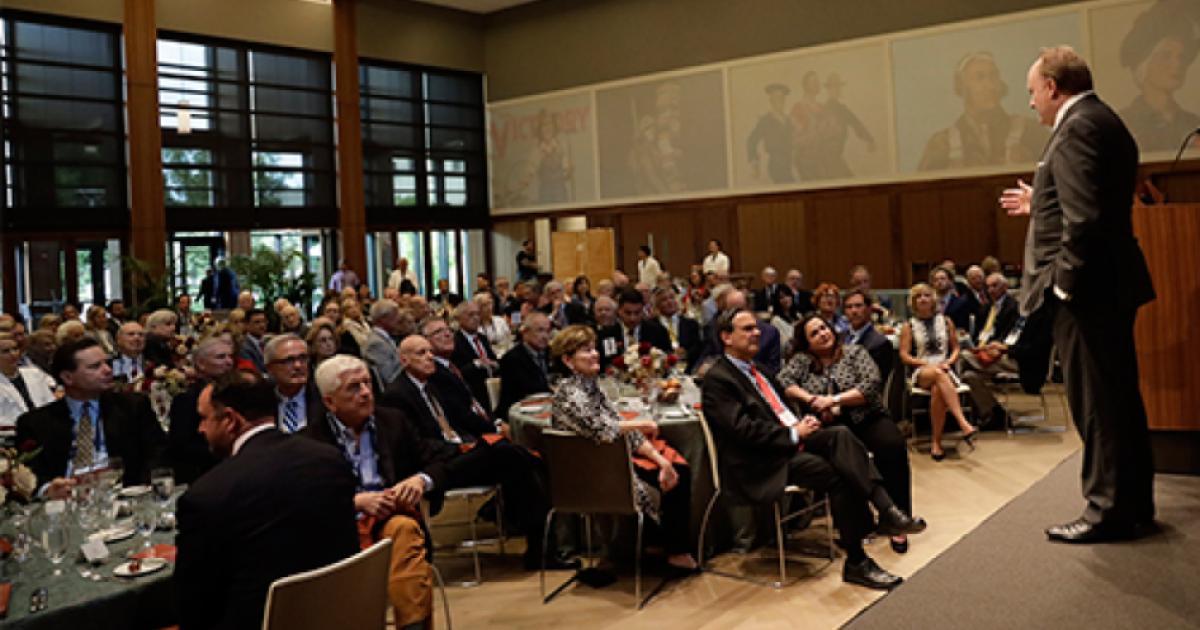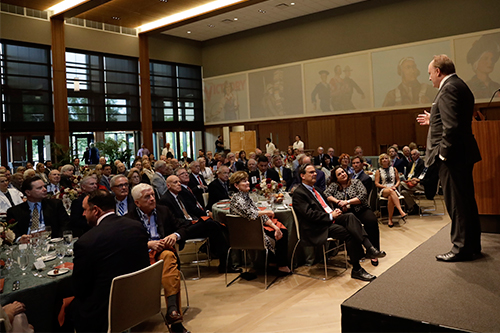
On the opening night of the Summer 2019 Board of Overseers Meeting of the Hoover Institution, the assembled group of overseers and fellows received a pre-dinner lecture that set an appropriately lofty tone.
The speaker was Winston Churchill biographer Andrew Roberts, Roger and Martha Mertz Visiting Fellow. Roberts—fresh from publishing his acclaimed 1,103-page book on Churchill—was there to talk about his subject’s “walk with destiny.”
During his talk, Roberts asked the rhetorical question, “Why did Churchill spot Hitler for who he was when others did not?” The reasons are instructive to us today.
WINSTON CHURCHILL’S CHALLENGE
First, Churchill respected the Jewish people. He knew many of them and understood their history. He perceived anti-Semitism to be an “early warning system” of bad intentions toward humanity in general. He recognized trouble with Hitler.
Second, Churchill was a historian. He saw what was happening in Europe against the backdrop of history and sensed danger. He had also seen fanaticism in his years in North Africa and studied it afterwards. He recognized Hitler to be a fanatic.
Churchill had tremendous moral courage to face difficult times—and to honestly admit that difficult times had arrived, like it or not. The prime minister also possessed extraordinary eloquence of the type that communicated to every level and sector of his society. He was clear, simple, and profound all at once.
OUR CHALLENGE
The following afternoon, Victor Davis Hanson, Martin and Illie Anderson Senior Fellow, delivered a riveting lecture entitled “The Crisis of the West.” While America and Europe face external threats, Hanson focused on what he sees as the more pressing problems of internal challenges—weaknesses from within that, if not countered, could undermine our ability to face the threats from without.
“Our problem,” he remarked, employing an allegory, “is not starvation but obesity.” The West, he said, is beset by problems _____. Elites hypocritically apply rules to others that they themselves do not follow. Unequal application of the law that erodes the social order. And many Americans sense that popular culture is controlled by those hostile to their fundamental values.
He called on those such as the Hoover overseers to leverage Hoover’s position to champion “ideas defining a free society” and push back against the crisis.
Seeming to echo Andrew Roberts’s characterization of Churchill, Hanson said that those who have the historical depth to perceive the problems today must summon the moral courage to stand face to face with our challenges and to assist in communicating answers to a society that needs them.
A DECADE WITH NO WRITTEN DEFENSE STRATEGY?
That night, former US secretary of defense General Jim Mattis, Davies Family Foundation Distinguished Fellow, explained how his experience prior to joining the Trump administration had been crucial to meeting growing foreign crises.
He expressed gratitude that in the military and in the administration he had the privilege of “contributing directly to the survival of this experiment we call America.” General Mattis said that, in preparing for the job, his initial time at Hoover was “a godsend.” He also learned that Hoover’s Blueprint for America, created before the administration took office, was more valuable than anyone knew.
On his first day at the Pentagon, he said, he asked for the most recent edition of the National Defense Strategy. And he learned there had been n published for almost a decade. Instead, Hoover’s Blueprint would provide a basis for a strategic framework.
General Mattis then detailed the serious challenges America faces and outlined several steps to squarely face those challenges—all of which will take the same courage and historical perspective that Roberts had described as belonging to Churchill.
HOOVER’S STRATEGIC PLAN
Almost two years ago the Hoover Institution launched a strategic plan, centered around strengthening its core of the archives and fellows, and communicating the ideas defining a free society to more Americans beyond the “policy sphere.”
At the Overseers Meeting, attendees saw the strong progress being made in fulfillment of the strategic plan. Most important, they saw how the plan is not focused inward. It is rather designed to maximize both the impact of the Hoover Institution and the value of every supporter’s investment in it through answering the challenges outlined by the meeting’s speakers.
Hoover’s plan fits the pattern defined by Andrew Roberts in his examination of Churchill. It recognizes history, acts with courage, and communicates clearly to a broad public.
UNDERSTANDING HISTORY
Hoover’s plan is informed by an understanding of the historic times in which we live. Eric Wakin, Robert H. Malott Director of the Hoover Library & Archives, described the importance of expanding and protecting these rich resources archives. Doing this will ensure they continue to provide research opportunities to scholars seeking to apply the lessons of the past to the challenges of today and tomorrow—just as Herbert Hoover intended.
Joshua Rauh, Hoover’s director of research, outlined how the Institution is adding fellows of only the highest quality to its team after rigorous vetting. As he stated, after presenting slide after slide of stellar additions, “No other policy research center hosts fellows of this caliber.”
The investment in Hoover’s core is paying off in terms of impact on American society at the highest levels and also engagement among all social strata to perpetuate a free society in accordance with America’s founding values
ACTING WITH COURAGE
Hoover’s plan is rooted in the ideas, principles, and values that animate American freedom and ordered liberty. The archives exist to preserve and disseminate the documented essence of those ideas. The fellows generate policy ideas that bring those values to life and maintain a high bar for intellectual rigor in advancing our civilization.
This is not always popular right now. But it is right and necessary. For example, much of Hoover fellows’ research goes against the grain of many ideological biases in today’s academia. Hoover sees that as an asset. The truth must win out over intellectual fads and questionable doctrine.
COMMUNICATING AND MAKING AN IMPACT
Finally, Hoover’s progress mirrors Churchill’s desire to widely disseminate good ideas in ways that anyone can understand—and with a clarity that lends these communications persuasive power.
To that end, the overseers were greatly heartened by the presentation covering Hoover’s PolicyEd program, which outlined several tactical initiatives aimed at using media and language that break through to younger minds—including those who might disagree with our viewpoints until they encounter Hoover’s compelling videos and other internet communications.
Christopher Dauer, Hoover’s director of strategic communications and marketing, described a “two-armed” approach to attracting the wider public back to our principles. One arm informs policy makers about Hoover research and analysis. This is essential work, but it is not enough.
The other arm of the strategy, as Dauer explained, frames Hoover scholarship in the language and preferred communication venues of younger, non-expert audiences. This is the aim of PolicyEd, to educate this grassroots audience and build awareness about Hoover’s ideas.
The PolicyEd program produces high volumes of carefully scripted, innovatively filmed, and highly engaging videos featuring Hoover scholars and creative animation to make ideas understood—and convincing, even to young liberals.
IS IT WORKING?
PolicyEd’s initial results are extremely encouraging and ahead of projections: nearly 90 million video views between late 2016 and August 2019; 125 videos produced; 659,300 views per video, on average; 360,000 Facebook followers; and 77,000 followers who view Hoover videos regularly . . . and share them.
Perhaps most important, 63 percent of PolicyEd’s viewers are ages 18 to 44. More than 60 percent are female.
THANK YOU
Hoover supporters are the real heroes in this struggle to shape the coming century—Hoover’s second century—with the ideas defining a free society. To keep society free, ideas are essential. And Hoover supporters, including the Board of Overseers, everyone who donates, and everyone who shares Hoover information, are providing the vital resources and energy to perpetuate this mission.
Thank you for all you do for our Institution and for the future of America’s liberty and social virtue.







